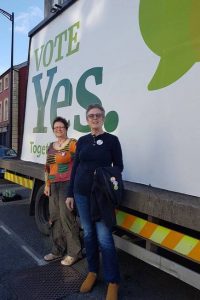
Bernie Linnane – Leitrim ARC
On a chilly November afternoon, in 2012, I stood among a small crowd in Sligo. We had gathered to protest, to express our anger, our anguish at the senseless death of Savita Halappanavar, which had occurred a month earlier. Similar vigils and marches were taking place all over the country as people took to the streets to give voice to their rage, their frustration, their shame at the tragedy which had taken place in Galway. We didn’t know what else to do, so we stood together, holding candles, trying to light the darkness we all felt had descended upon us.
Recently, I looked at newspaper pictures of that day in Sligo. Today, I recognise many of the faces of the people who came together to try and make sense of what had happened. Some of them have since become firm friends. Some are my much-admired heroes. Some are both. All are imprinted on my memory of what was, for me and for so many others, a pivotal moment. That was the day we decided there would be no more tragedies, no more deaths caused by the Eighth Amendment. No more Savitas. Never again.
I was 51 in 2012. It was not my first vigil. Not my first march. I had been out on the streets in 1983, campaigning against the push to insert the Eighth into our constitution. I had been out again in 1992, when the horror of the X-Case become known – a 14 year-old child effectively imprisoned by our state because she had been made pregnant by rape. Sometimes I look back at those days and wonder how we let that go by without burning the whole establishment down. I wonder how all those women, those girls, whose names we were never allowed to know, but who became part of our shared national shame under letters of the alphabet, were permitted to suffer while we pretended holy, Catholic Ireland was a real place and not just a figment of some warped, fundamentalist, collective imagination.
Everything changed with the death of Savita. I was old enough to be her mother. I had a daughter of my own and could hardly bear to think about the torment Savita’s mother must have been enduring, while we stood, impotently, holding candles and pictures of her beautiful girl. I felt sadder that day than I had been in years. I cried tears of grief for a woman I had never known and for the daughter she had lost. I felt the sting of bitter indignation and frustration at the way women in our country had, for all my adult life, been consigned to a fate of suffering, even death, by a system which regarded them as little more than vessels to produce offspring. I went home that evening and knew that I could not, would not, rest while our laws reduced my daughter to no more than her reproductive organs, denying her agency over her own body, which was to be used as the state saw fit, even against her will. My tears gave way to rage. I got angry. I was not alone.
In May of 2018, I stood at Glencar Waterfall, one of the loveliest and most special places in Lovely Leitrim, again holding a picture of Savita Halappanavar. Her beautiful face had become a talisman by now, an evocative image that conjured up feelings of sadness and loss but also resolve and determination to change the system which had robbed her of life. Around me stood the people of the Leitrim and Sligo Together for Yes groups, who had campaigned tirelessly in the run up to the referendum vote which was to take place the following morning. We stood in a circle, with candles at our feet, holding placards bearing the names of women who had been harmed by the Eighth Amendment and by our country’s harsh and uncaring regime. Just one placard bore a picture. No name was necessary.
Some of the people who stood at Glencar that evening had stood together before, at the Sligo vigil in November 2012. All of them stood for what was right, what was just and what was fair for the women and pregnant people of Ireland. This time our candles lit the darkness as the sun went down on the most hated Eighth Amendment. Never again.

